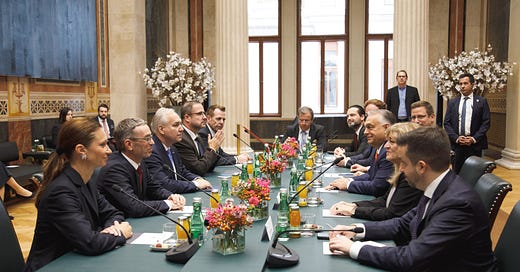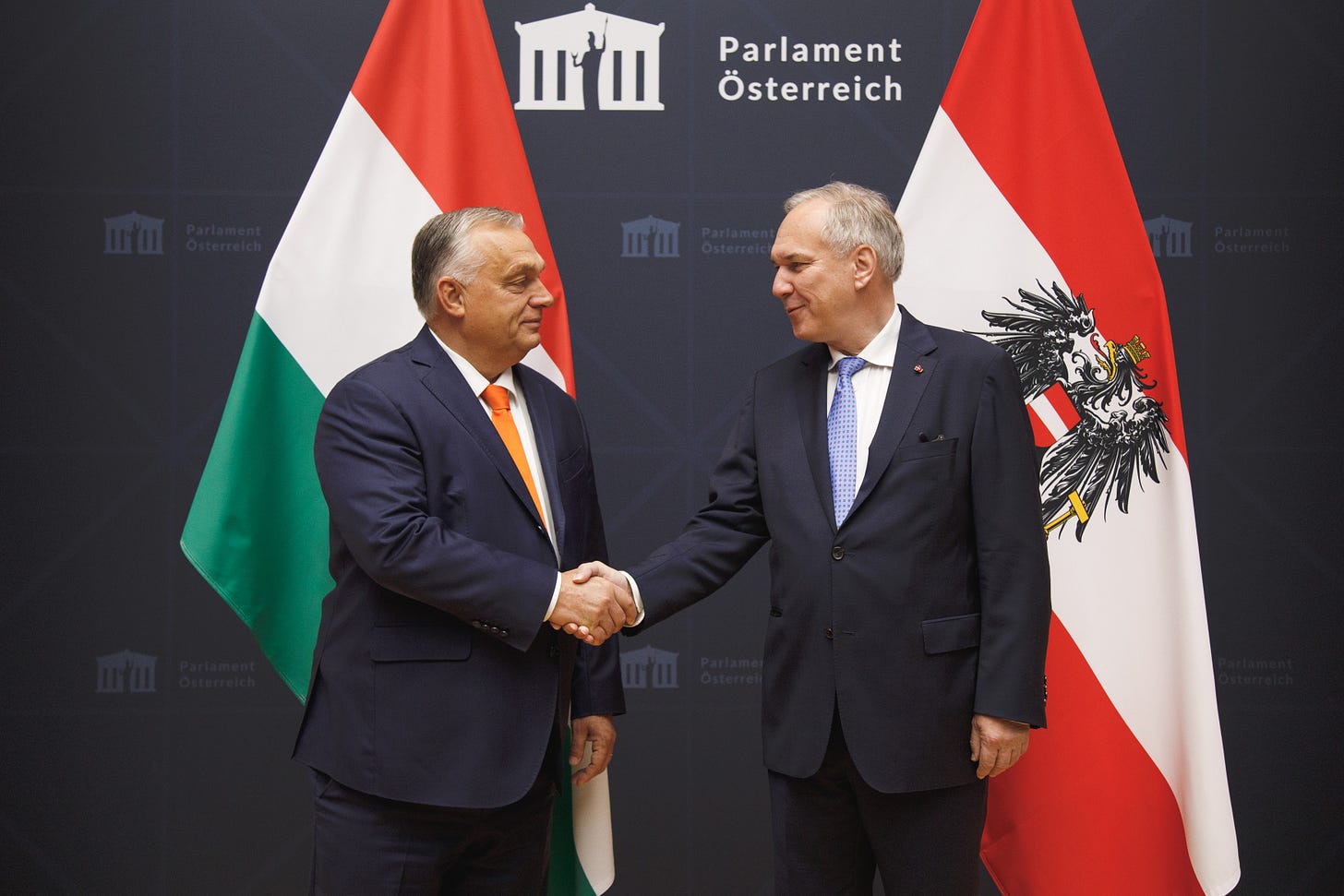Parliament And Propaganda
Hungary's prime minister visited Austria's parliament last week for working discussions at which only members of the far-right Freedom Party were present
Servus!
On Thursday morning, Hungarian prime minister Viktor Orbán arrived at the Austrian parliament for what were later described as ‘working discussions’ with the new president of the Austrian parliament, Walter Rosenkranz from the far-right Freedom Party (FPÖ). Present at these discussions was what was further characterized as an ‘Austrian delegation,’ even though it was only made up of the FPÖ—Herbert Kickl, Christian Hafenecker, Susanne Fürst, and Harald Vilimsky—and it is unclear whether members of other parties were invited at all.
The conclusion of these working discussions was the moment Orbán and FPÖ leader Kickl co-signed their ‘Vienna Declaration.’ Ostensibly a working agreement between the FPÖ and Orbán’s Fidesz Party who are partners in the same alliance of European far-right populist parties, the declaration curiously began as follows: “Hungary and Austria hereby reaffirm their good neighborly relations and their unshakable historical and cultural ties.” Though in no capacity to do so, Kickl appeared to be speaking and acting in the name of the republic while conducting party political business.
“Contrary to what he may claim, Kickl cannot speak for Austria—and especially not all Austrians. Once again, he has shown he doesn't care one bit about the democratic process,” the conservative People’s Party (ÖVP)’s party secretary Christian Stocker said in a statement Friday. One of Kickl’s harshest critics, Stocker described the FPÖ leader’s politics as “hubris and provocation” and accused him of acting in a way that was neither “statesmanlike” nor “patriotic.” Stocker noted, too, that when Rosenkranz and Orbán shook hands for the press, while the Hungarian and Austrian flags were present, the EU’s was curiously absent.
Rosenkranz in his capacity as president of the Austrian parliament is within his right to invite to parliament whomever he wants, but Orbán’s working visit bodes ill for the institution’s future. It suggests that Rosenkranz, Kickl, and the FPÖ would be willing to adopt parliament as a platform on which to stage and orchestrate party political propaganda, with Rosenkranz using his office to give the FPÖ’s schismatic, right-wing populist agenda a veneer of official respectability. Rosenkranz, Social Democratic Party (SPÖ) leader Andreas Babler said last week, “lived up to his own description of himself as a ‘party soldier’ by receiving as his first guest the very man who has transformed [Hungary] into a corrupt oligarchy.”
“It’s about symbols and signals, and this signal is a fatal one,” Green Party leader Werner Kogler—who opposed Rosenkranz’s election—said. Sigi Maurer, head of the Greens’ parliamentary party, noted too that, in his first week in office, Rosenkranz gave a media interview to a former leading figure in Austria’s far-right identitarian movement. The conversation was broadcast by Auf1, a small, far-right website and news channel based in Linz that has become a popular haunt for FPÖ politicians and is part of Austria’s alternative far-right media ecosphere.
Rosenkranz was elected president of the Austrian parliament by a majority of MPs on the basis of parliamentary custom: that parliament’s president has, for as long as the Second Republic has existed, come from the largest party in parliament. Parliamentarism by custom, however, only works when all parliamentary parties tasked with upholding those customs are willing to do so. MPs may have dunderheadedly handed the FPÖ an enormous gift: an alternative source of power and prestige that they could potentially wield to advance their agenda and undermine the next government that appears to be coming together without them.
Bis bald!
Thank you for subscribing to the Vienna Briefing. A personal recommendation is the best way to grow the reader community, so if you know someone who might be interested in this newsletter, consider sharing it with them today.
The Vienna Briefing is a free, reader-supported publication made possible by your generous contributions. If you like and would like to support my work on this newsletter, think about sending me a tip.
President Out Of Action
President Alexander Van der Bellen is to undergo disk surgery, his office announced on Saturday afternoon. During the period of surgery and recovery, the president will be represented by chancellor Karl Nehammer.
Minister Steps Back
Karoline Edtstadler, minister for Europe and the constitution, is to step back from frontline politics, she told the Kronen Zeitung over the weekend. While she plans to retain her seat in parliament, Edtstadler will also return to her home state of Salzburg and open a legal practice there.
Inflation Firm, Unemployment Wobbly
Inflation in Austria held steady at 1.8 percent in October, according to initial estimates. Unemployment, meanwhile, crept up to 6.9 percent last month even though the employment rate and the number of vacancies remain high, indicative of a tight labor market.





